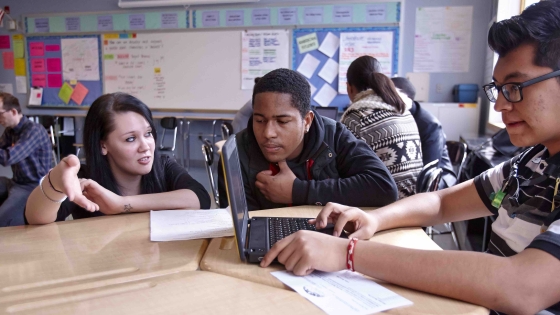A First Look at the iMentor College Ready Program
Lisa Merrill, Nina Siman, Suzanne Wulach, and David Kang (July 2015)
The iMentor College Ready Program is a unique model that combines elements of school-based mentoring, whole school reform, and technology in an effort to help students develop the knowledge, behaviors, and skills needed to reach and succeed in college. It is an intensive, four-year intervention offered in schools that serve low-income students. Students are paired with volunteer, college-educated mentors and enrolled in an iMentor class led by a school-based iMentor employee.
The program has four central elements:
- A whole school model, which aims to match all incoming 9th graders with a mentor, and keep them engaged for their full high school careers;
- A college-readiness curriculum developed by iMentor, taught by iMentor staff in weekly classes, and reinforced during monthly events for mentees and mentors;
- A “blended” approach to developing relationships between students and their mentor. Students communicate with their mentor primarily through email, but also meet in person at the iMentor events; and
- A pair support strategy based on a case-management model for tracking mentee-mentor relationship development.
The Research Alliance for New York City Schools is conducting an in-depth evaluation of the iMentor College Ready Program in eight New York City high schools. With support from the Social Innovation Fund, the Research Alliance is examining iMentor’s roll-out and implementation in these schools, as well as its impact on a range of outcomes related to students’ preparation for college.
This report is the first in a series from our evaluation. It focuses on iMentor’s first year of implementation, which targeted 9th graders in all eight schools. The report provides a detailed description of the four key components of the iMentor College Ready Program and assesses the implementation of these program elements against specific benchmarks established by iMentor. The report also presents a first look at iMentor’s effects on 9th graders’ outcomes, including their perception of adult support, their aspirations for the future, a set of important college-related “non-cognitive” skills, and several markers of academic achievement.

